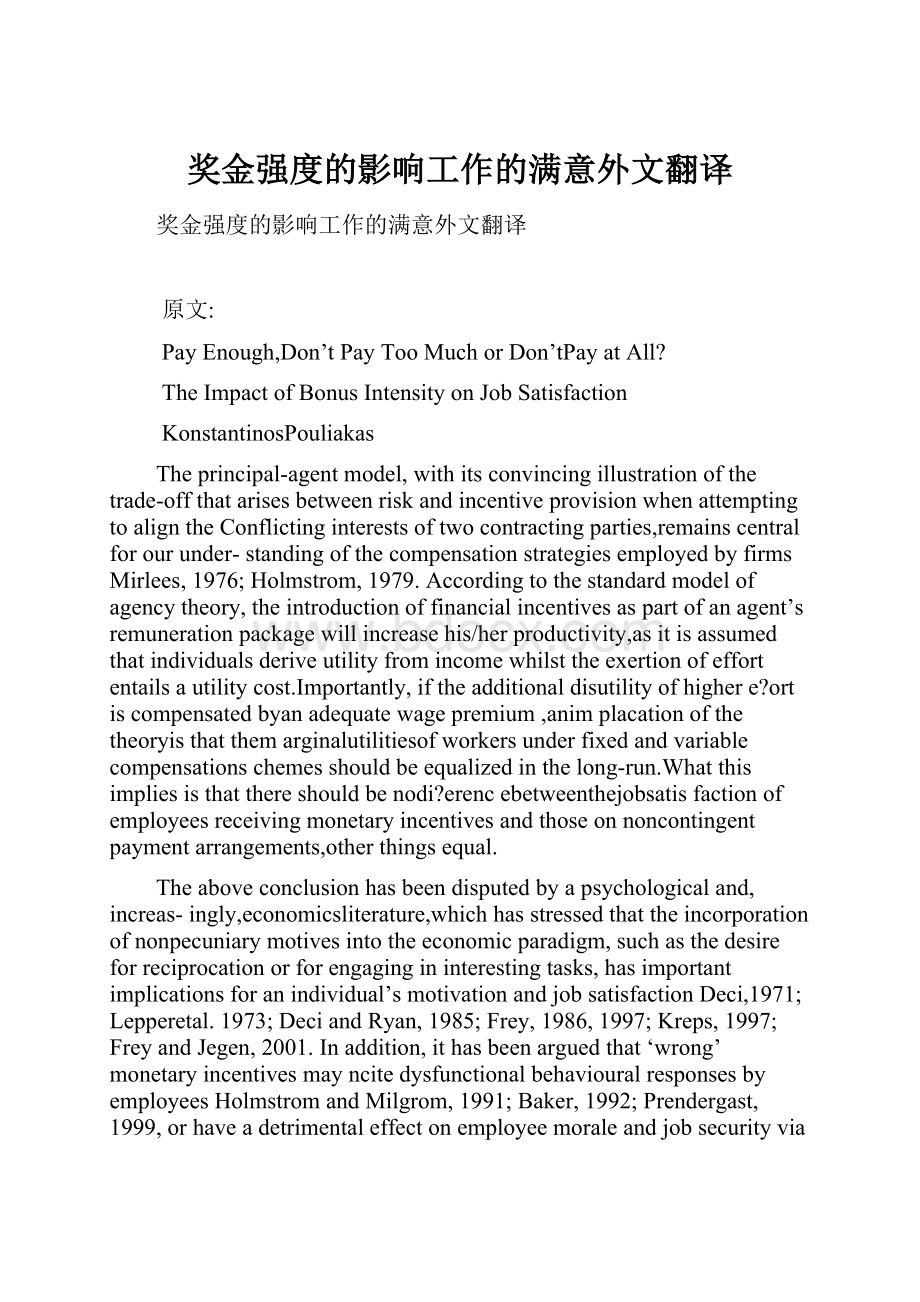奖金强度的影响工作的满意外文翻译.docx
《奖金强度的影响工作的满意外文翻译.docx》由会员分享,可在线阅读,更多相关《奖金强度的影响工作的满意外文翻译.docx(10页珍藏版)》请在冰豆网上搜索。

奖金强度的影响工作的满意外文翻译
奖金强度的影响工作的满意外文翻译
原文:
PayEnough,Don’tPayTooMuchorDon’tPayatAll?
TheImpactofBonusIntensityonJobSatisfaction
KonstantinosPouliakas
Theprincipal-agentmodel,withitsconvincingillustrationofthetrade-offthatarisesbetweenriskandincentiveprovisionwhenattemptingtoaligntheConflictinginterestsoftwocontractingparties,remainscentralforourunder-standingofthecompensationstrategiesemployedbyfirmsMirlees,1976;Holmstrom,1979.Accordingtothestandardmodelofagencytheory,theintroductionoffinancialincentivesaspartofanagent’sremunerationpackagewillincreasehis/herproductivity,asitisassumedthatindividualsderiveutilityfromincomewhilsttheexertionofeffortentailsautilitycost.Importantly,iftheadditionaldisutilityofhighere?
ortiscompensatedbyanadequatewagepremium,animplacationofthetheoryisthatthemarginalutilitiesofworkersunderfixedandvariablecompensationschemesshouldbeequalizedinthelong-run.Whatthisimpliesisthatthereshouldbenodi?
erencebetweenthejobsatisfactionofemployeesreceivingmonetaryincentivesandthoseonnoncontingentpaymentarrangements,otherthingsequal.
Theaboveconclusionhasbeendisputedbyapsychologicaland,increas-ingly,economicsliterature,whichhasstressedthattheincorporationofnonpecuniarymotivesintotheeconomicparadigm,suchasthedesireforreciprocationorforengagingininterestingtasks,hasimportantimplicationsforanindividual’smotivationandjobsatisfactionDeci,1971;Lepperetal.1973;DeciandRyan,1985;Frey,1986,1997;Kreps,1997;FreyandJegen,2001.Inaddition,ithasbeenarguedthat‘wrong’monetaryincentivesmayncitedysfunctionalbehaviouralresponsesbyemployeesHolmstromandMilgrom,1991;Baker,1992;Prendergast,1999,orhaveadetrimentaleffectonemployeemoraleandjobsecurityviatheinequitableandriskypaydistributionsthatariseasaconsequenceBakeretal.,1988.
Oncethesemechanismsaretakenintoconsideration,itbecomesclearthatthetheoreticalimpactofmonetaryincentivesonworkereffortandjobsatisfactioncanbeambiguous.AscorroboratedinanumberofeconomicexperimentsFalkandKosfeld,2006;ErikssonandVilleval,2008,theincentiveeffectsofmonetaryrewardsarelikelytobecompromisedinaworldofimperfectlabourmobilitypopulatedbyheterogeneousagentswithvaryingpsychologicaldispositions.Totheextentthatincentiveschemesallowforoptimizationofeffort,facilitateworkerautonomyandenhanceself-determinationtheyshouldincreasejobsatisfaction,otherthingsequal.Yetincreasingearningsrisk,crowdingoutoftheinherentpleasantnessinperformingone’sjobandlowermoralecanleadtodisgruntledemployees.
Thestudyoftheeffectofmonetaryrewardsonjobsatisfactionisthereforeanempiricalissue,whichhasonlyuntilrecentlyreceivedanyattention.Inparticular,anumberofstudieshaveshownthatinBritainbonusesresultinhigherjobsatisfaction,althoughtheeffectofindividual-basedperformancerelatedpayPRPsystemsisnotasclear-cutonceunobservedheterogeneityistakenintoaccountDragoetal.,1992;McCauslandetal.,2005,Artz,2008,GreenandHeywood,2008;PouliakasandTheodossiou,2009.UsingUSdata,HeywoodandWei2006havealsoconfirmedthatalltypesofPRPbarpieceratesyieldgreaterjobsatisfactionrelativetotimerates.
Apotentialdeficiencyoftheabove-mentionedstudiesisthattheyonlyfocusonthediscretedifferenceinjobsatisfactionbetweenworkersreceivingPRPandthoseonalternativeschemes.Thus,theyignorethefactthatworkerperformanceandsatisfactionmayvaryaccordingtothemagnitudeofincentives.AssuggestedbyaseriesoffieldexperimentsperformedbyGneezyandRustichini2000[a],p.802,‘‘forallpositivebutsmallenoughcompensaions,thereisareductioninperformanceascomparedwiththezerocompensation,or,better,withthelackofanymentionofcompensation’’.Nevertheless,oncetheextrinsicmotivationislargeenough,itresultsinbetterperformancethanintheno-incentivecase.Thisnon-monotonicityinthereactionofworkerefforttobothpositiveandnegative//.usesorfines,respectivelyhasconsequentlybeentermedthe‘‘Weffect’’ofincentivesGneezy,2004.Bycontrast,therecentexperimentalstudyofPokorny2008findsaninverseU-shapedrelationshipbetweeneffortlevelsandincentiveintensity.
Thispaperattemptstotesttheabovecontrastinghypothesesbylookingbeyondthemereincidenceofincentivepayandexaminingtheimpactoftheintensityofincentivesi.e.theproportionofworkers’salarythatistiedtobonusesonjobsatisfactioninstead.Specifically,10waves1998?
2007oftheBritishHouseholdPanelSurveyBHPSareusedtoinvestigatetheassociationbetweenthepowerofbonuspaymentsandtheutilityderivedfromwork,holdingtheincidenceofindividual-basedPRPandotherimportantdetermi-nantsconstant.Aftercontrollingforindividualfixedeffectssuchasabilityormotivationthatmaybiastheinfluenceofpaymentschemesonjobsatisfaction,jobutilityisfoundtoriseonlyinresponseto‘large’bonuspayments.Evidenceisalsopresentedthatrevokingabonusfromoneyeartothenextislikelytohaveadetrimentaleffectonemployeeutility,andthatovertimejobsatisfactiontendstodiminishasemployeespotentiallyadapttothepaymentofbonusesTheempiricalevidenceofthepaperisthereforeconsistentwithGneezyandRustichini’s2000[a]assertionthatemployerswishingtomotivatetheirstaffshouldindeed‘‘payenoughordon’tpayatall’’.
Thestructureofthepaperisasfollows.Section2engagesinareviewoftheavailableliteratureontheeffectoffinancialincentivesonjobsatisfaction.InSection3thedatausedinthestudyaredescribedandpreliminarystatisticalcorrelationsareoutlined.Section4describesthebasiceconometricmethodologyusedinthepaper.Section5outlinesthemainempiricalresultsoftherelationshipbetweenincentiveintensityandtheutilityderivedfromemployment.Section6examinestheheterogeneityinthesamplefurther.Finally,Section7concludes.
Thegrowingeconomicsliteratureonsubjectivewell-beingFreyandStutzer,2002;BlanchflowerandOswald,2004;VanPraagandFerrer-i-Carbonell,2004;EPICURUS,2007;Frey,2008hasemphasizedthatmeasuresofjobsatisfactionaresignificantpredictorsofemployeebehaviour[//.tsFreeman,1978,absenteeismClegg,1983orworkerproductivityJudgeetal.,2001].Itfollowsthatunderstandingtheinfluenceofmonetaryincentivesonjobsatisfactionisimportantgiventhatthecompositionofanemployee’sremunerationpackageisanintegralelementofhis/heroverallworkingconditions.
ThefactthatfirmstypicallyemployawidearrayofincentiveinstrumentshasbeenattributedtothefundamentalagencyproblemthatplaguestheemploymentrelationshipGibbonsandWaldman,1999.Inordertocombattheproblemofmoralhazard,firmsdesignincentivecontractsthatseektoachievegoalcongruencewiththeiremployeesMirlees,1976;Holmstrom,1979.
Furthermore,asshownbyLazear1986,2000,theintroductionoffinancialrewardsshouldinducemorehighlygearedworkerstoputforthextraefforttothepointwherethemarginalvalueaddedequatesthemarginalcostoftheadditionallabour.Inlong-runequilibrium,however,onewouldnotexpecttoobserveanydifferencesinthemarginalutilitiesofcomparableworkersunderfixedorvariablepaymentschemes,astheexpectedvalueofthehigherwagespaidunderPRPshouldbejustsuffcienttocompensatefortheadditionalearningsriskandthedisutilityofextraeffortMas-Colelletal.,1995.
Oncethestandardassumptionsoftheagencymodelarerelaxed,though,therearemanyreasonstoexpectthatPRPislikelytohaveanon-negligibleimpactonjobsatisfaction.Expectancy-basedtheoriesoforganizationalpsychologyhaveassertedthatattitudesaboutworkareshapedfromtherewardsproducedbyperformance,whicharevaluedoutcomesinthemselvesLawlerandPorter,1967.Furthermore,ithasbeenarguedthatPRPisanintegralelementofso-called‘highperformanceworkplacepractices’,whichhavebeenfoundtobepositivelyrelatedtojobsatisfactionBauer,2004.
OtheraspectsofPRPmay,nonetheless,diminishproductivityandworkersatisfaction.Ithasbeenillustratedthatwronglydevisedcompensationschemescanhavecounterproductiveconsequences,astheymayencourageworkersto‘game’thecompensationsystemtotheiradvantagebymultitaskingBaker1992orbyengaginginrent-seekingbehaviouraimedatinfluencingthesubjectiveevaluationsoflinemanagersPrendergast,1999.Holmstrom’s1982seminalpaperhasalsoshowedthatutilizingteamproductionincentiveschemessuchasprofit-sharingmaydiluteindividualperformanceasaresultoffree-riding.InthefaceofevidencesuggestingthatthejobsatisfactionofemployeesisintrinsicallylinkedtotheirrelativepaystatusClarkandOswald,1996;Clark,1999;Ferrer-i-Carbonell,2005;Clarketal.,2008[a],thedemoralisingdispersionandvariabilityinwagesthatensuesfromPRPschemesisalsolikelytoaffectattitudestoworkinanegativefashion.Furthermore,ithasoftenbeenclaimedthatfinancialincentivesunderminecollaborationandteamwork,emphasizethepowerasymmetrybetweenmanagementandtheworkforce,andreduceemployeerisk-takingandinnovationKohn,1993.
Addedtotheaboveisaprominentnon-economiccriticismofPRPwhichisBasedontheso-calledcognitiveevaluationormotivationcrowding-outhypothesisDeciandRyan,1985;FreyandJegen,2001.AccordingtothistheoryofSocialpsychologyonceitisacknowledgedthatindividualsmayderiveintrinsicsatisfactionfromtheirjobs,explicitrewardsthatareperceivedascontrollingdevi